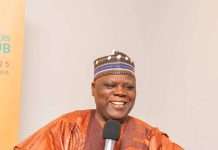
Distinguished Professor Herbert Afamefuna Babington Coker is an erudite scholar and researcher of great repute. A devout Christian and retired professor of pharmaceutical chemistry, Coker is especially acclaimed for his contributions in the area of sickle cell disease (SCD), among numerous other accomplishments. The University of Port Harcourt, where he has lectured for the past 12 years, on a largely pro bono basis.
Fondly called “Rabbi” within the precincts of the College of Medicine, University of Lagos because of his very friendly disposition to colleagues and students, the revered don jocularly refers to himself as “Rabbi and the Lord Bishop of the Lost Tribe (slave returnees) of Nigeria.” In this exclusive interview with MOSES DIKE, Professor Coker lets us into the interesting world of his upbringing, education, career, and retirement. Excerpts (Contd from the last edition):
Having attained the compulsory retirement age of 70, you exited active service in August 2021 from the Faculty of Pharmacy, University of Lagos. Can you share with us some of the highlights of your 37-year career on the faculty? What would you consider as your biggest legacy there?
I joined the academic staff of the School of Pharmacy, at the University of Lagos in 1984. I was very privileged and lucky to serve under mentors, such as Prof. Etienne Essien and Prof. Duma-Badu who took me through the labyrinths of information dissemination and the art of good teaching. I was a fresh Ph.D. graduate from Glasgow with all the knowledge of Synthetic Pharmaceutical Chemistry and Spectroscopy, but the very fine techniques of engaging youngsters and making them appreciate knowledge-based Medicinal Chemistry and the application of the subject matter to everyday practice by the professional is a different ball game.
My very senior colleagues, Essien and Duma-Badu, were to take me through the nitty-gritty, right from 200 levels to the MSc classes. As a matter of fact, Prof. Duma-Badu would go through my lecture notes and put his red pen on every paragraph of my entire lesson notes. I humbled myself and subjected myself to these various learning curves. The multiplier effect of this method of teaching ensured that, by the second semester, I had become a champion of the trade with time. I started noticing that I was being endeared to the students. I doubled up on that with some industry and self-application.
With time, my publication prowess improved a great deal. Professor Essien would pass by my door and say “Dr. Coker, we are owing the press some papers.” I got to know later that Prof. Essien expected that the ideas we shared together the previous day were meant to be implemented on the bench and the results arising therefrom developed for publication purposes. Put summarily, these gentlemen were my academic fathers in Israel.
At a point in time, there was a professional exodus in Nigeria; the academic staff was leaving for overseas countries, especially Saudi Arabia. I got an invitation to an assistant chief pharmacist, in Riyadh, Saudi Arabia. As I was preparing to leave for Saudi, my mother passed on. Obviously and sensibly, her burial and last funeral rites commanded the pride of place in my chequered agenda.
I was a little bit dejected and disappointed. I braced up for another interview that came up with a slot for Oman. No sooner had I got the letter of an invitation than my father passed on, on 4 December 1991, and was laid to rest on December 20, 1991. Then I shelved the idea of traveling altogether.
When all was past and done with, Prof. Essien wrote to me and encouraged me to get myself together and settle for serious work. He said he wanted me to sit on that chair before my colleagues returned from the diaspora. On my visits to Uyo, we spoke at length in the presence of Prof. Etim Moses Essien, the renowned hematologist.
The post of professor of Pharmaceutical Chemistry was advertised in the newspapers about one or two years later. I was then a senior lecturer. We all went for the interview and at the end of the day, it pleased the good Lord Almighty to lift Prof. Coker on to the chair of Pharmaceutical Chemistry, at the University of Lagos. I must sincerely commend Professor Etim Moses Essien, who has been my mentor in the area of Haematology and Internal Medicine.
Essien had listened to my delivery on Xenobiotics and sickling in sickle cell diseases (SCD). He was present at the Federal Palace Hotel with other hematologists, such as Prof. Akinsete, Prof. Akinyanju, and many other medical doctors. There was this Imbroglio between pharmaceutical scientists and hematologists. The hematologists were completely averse to some of the claims of pharmaceutical scientists and traditionalists. The Nigerian Association of hematologists released a communique at the end of the exercise at that Federal Palace Hotel, dispelling any beneficial effect of any natural product not approved by the association in the management of sickle cell disease.
Prof. Essien called me later to his room at the Federal Palace Hotel. During our discussion, he bared his mind on SCD and opened my inner eyes to the physiology and pathology of sickle cell and sickling. We perused his post-doctoral work at Macmaster University. At 1:00 am in morning, I was still with Prof. Essien, listening to this narrative, just like a father talking to his son who is also a participant on the bench. Unfortunately, we lost Prof. Essien; he passed on some two to three years ago. I paid homage and rendered my tribute to the family.
The recently discovered medication, Adulhem (Aducunamab) reminds me of Professor Essien’s post-doctoral work at Macmaster University, where he was looking at the myriads of enzymes connected with the sickling phenomenon. The mechanism of action of Adulmem, we are told, is based on the inhibition of certain proteinous enzymes connected with sickling; and this was what Prof. Essien was highlighting to me so many years ago.
In effect, Prof. Essien opened my thoughts to the fact that beyond medicinal chemistry, a target-oriented approach to discovering new molecules can bring about anti-sickling, a fundamental phenomenon in Drug Discovery. I should say our own Prof. Etim Essien should share in this glory of the discovery of Adulhem.
My circumstance and physical health notwithstanding, our struggle in the area of sickle cell disease continues. Even in retirement, my junior colleagues and young Ph.D. holders are up to the task and by the grace of God, we will make our pointed contributions.
At what point in your career were you elevated to the position of distinguished professor? What were the factors or achievements that qualified you for this elevation?
Well, I sincerely appreciate the University of Lagos for considering me appointable as a distinguished professor of Pharmacy and Pharmaceutical Chemistry. It is an honorable post and the university has a Senate Committee that looks into all applications and recommendations by the different faculties and relevant departments. The eligibility of any candidate is solely the responsibility of the Senate Committee, in line with the laid down criteria.
It makes me happy that my contributions, both academic and non-academic, are worth the while in the institution; but then I must let you know at any point in time that there are many other colleagues in the university who are just as good as any nominee but have not shown any interest. Some university professors and researchers are just contented with carrying on with their daily chores. My humble belief is that we are all contributing towards a common goal.
At the valedictory service held in your honor by the Faculty of Pharmacy, UNILAG, we learned you were popularly called “Rabbi” by the staff of the College of Medicine because of your supportive and friendly disposition towards staff and students some of whom have also become professors. How have you maintained your relationship with this group and what lessons do you have for younger lecturers?
If there are any benefits and joy in a teacher’s life, the event of 24 August captured it all. Even in the midst of the coronavirus pandemic and all the associated protocols, you could see how the entire alumni of the Faculty of Pharmacy turned out, either physically or by virtual representation.
With a strong element of humility, the university environment is never a bed of roses. There is always a rancor within the establishment, within the faculty, the departments, and within the various units. Every professor or academic personnel lives to tell his own stories if they so wish. Today it is “hosanna”, tomorrow it is “crucify him”. You might be entirely surprised that the youngsters you carried on your back, five to six years – sacrificing every effort and time that all may be well at the end of the day and even going further to provide and facilitate employment for him or her – may very well be the first person to hack you in the back when conditions become convenient.
If, at an auspicious time, an event like the send-forth comes around and you have a mammoth crowd of alumni come around to say, “Master, thank you very much and God bless you”, to me it simply shows appreciation. Leave the rest to God, Almighty.
My send-forth was a resounding testimony to the appreciation of a good teacher and mentor who has touched the lives of fellow mortals. The entire alumni came out and surreptitiously gave back to me what I equally gave to my teachers and mentors. It was all a gamut of interviews – a series of zoom interactions with the different 37 sets of grandaunts – all culminating in the event of 24 August. They all zoomed in on that day from various walks of life across Nigeria, and Britain, South Africa, Australia, the US, and Canada.
The physically present were not left out, they took turns to climb the podium and rendered their hearts, some read poems, and some made eulogies. Spiritually speaking, it was not me. It was God who came down on the 24th. I have so carried aback that I said to myself, “So this is the way God does His thing?”
Any day, anytime good mentorship holds the ace, a good teacher is a good teacher, especially when geared to the benefit of mankind and to the glory of God. In due time, your mentees will so honor you.
I was appointed Rabbi in Jerusalem on a trip with the Lagos State Government pilgrims on a visit to Israel. When I returned to Nigeria I announced myself as Rabbi and the Lord Bishop of the lost tribe (slave returnees) of Nigeria. We are the jurisdictional owners of Yaba South, Lagos. “Yaba, my Yaba, where the sun rises and never sets.”
How would you describe life in retirement and how has this affected your perspective of life generally?
I am retired now. Despite my circumstantial ill-health, I still engage in a lot of reading. I keep abreast of newer contributions in the areas of Pharmacy, Medicinal Chemistry, Bio pharmacy, Chemistry, Natural Product Chemistry, Clinical Pharmacology, and Therapeutics. My research activities in the areas of Alzheimer’s, sickle cell disease, and drug discovery, in general, are very much ongoing.
I still go to the College of Medicine three times a week. I have a small cubicle office given to me where I consult with my younger colleagues in the faculty and other related areas. I also entertain zoom sessions with my colleagues and professors who interact with me often.
How do you relax? Tell us about some of the pastime activities and lifestyle modifications you have adopted to stay fit and active.
During my heydays, I exercised a lot. I played soccer every weekend. I walked and engaged in a lot of horticulture activities. I must confess that my ill health really brought me down. But, then, I equally thank God Almighty for giving me the opportunity of bouncing back in life.
I thank my immediate family for all their support. I thank my very close friends, especially my consultants and physiotherapists who have stood by me and encouraged me to take up some physical challenges. During our morning workout, professor Ezike will say to me, “HAB, please go the extra mile”, and then we will walk and walk. We started with short distances and now we walk round the entire field two times.
Ezike makes me carry the weight and he makes me do the press up some 30 to 40 times. These are rather challenging and demanding physical exercises that help to bring out the best in me. I still plant flowers around about my dear and loving faculty and also my church, the Chapel of the Healing Cross, where I worship every Sunday morning.











